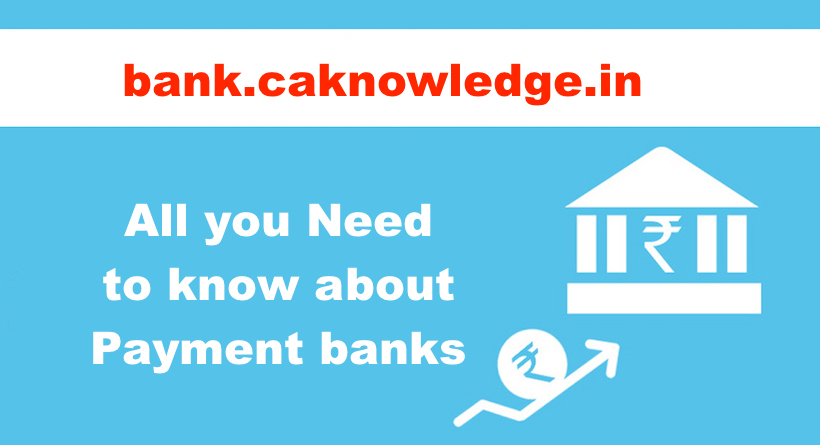Payment banks – Meaning, Main Moto, Features, Eligibility. Payment banks are the banks set up in accordance with the related regulations issued by the supreme monetary regulatory authority Reserve Bank of India. To say in simple lines payment banks will perform the activities they are allowed to do and they are different from the normal banks. read more on payment banks from below…
Quick Links
They do the following :
- Acceptance of deposits within the limits specified by the regulating authorities.(which is Rs 1 lakh currently)
- Remittance of amount among various channels.
- Issuance of ATM or debit cards.
- They can’t perform lending activities thus they can’t issue credit cards to the customers
- They will pay the interest on the amount of deposits received from the customers.
- They can offer foreign exchange services
- Distribution of non-risk sharing simple financial products like mutual fund units and insurance products, etc.
Must Read – Features of Fixed Deposit
Main Motto behind the introduction of payment banks in India :
They have been popular in the west since much earlier. The main purpose for which they have been formed is to widen the financial inclusion by providing the banking services with very ease of access along side of reducing the efforts of the customers to avail the services. In this transforming phase of mankind smartphone has become a necessity. Day by day the number of people owning a smart phone is increasing. With this one can avail the banking services from these payment banks without going and spending much time in the regular banks.
Reserve Bank of India in its guidelines said that “the objectives of setting up of payments banks will be to further financial inclusion by providing (a) small savings accounts and (b) payments / remittance services to migrant labour workforce, low income households, small businesses, other unorganized sector entities and other users.”
Must Read – Atal Pension Yojana
Guidelines for Licensing of Payments Banks as released by the Reserve Bank of India :
(1) Eligibility :
following can only act as payment banks
Existing non-bank Pre-paid Payment Instrument (PPI) issuers , and other entities such as individuals / professionals; Non-Banking Finance Companies (NBFCs), corporate Business Correspondents(BCs), mobile telephone companies, super-market chains, companies, real sector cooperatives; that are owned and controlled by residents; and public sector entities may apply to set up payments banks.
(2) Payment bank can be set up with a joint venture between the eligible party and an already existing scheduled commercial bank provided the commercial bank will hold the stake in the venture to the extent permitted by banking regulations act.
Must Read – Name of Top Banks in India
(3) Investment of funds procured :
A Payment bank will be required to invest minimum 75 % of its “demand deposit balances” in Statutory Liquidity Ratio eligible Government securities/treasury bills with maturity up to one year and hold maximum 25 % in current and time/fixed deposits with other scheduled commercial banks for operational purposes and liquidity management.
(4) Minimum capital requirement :
The minimum paid-up equity capital for payments banks shall be Rs. 100 crores.
The promoter’s minimum initial contribution to the paid-up equity capital of such payments bank shall at least be 40 per cent for the first five years from the beginning of its business.
Must Read – History of Banking in India
(5) Foreign investment :
The foreign shareholding in the payments bank would be as per the Foreign Direct Investment (FDI) policy for private sector banks as amended from time to time.
In August 2015 following eleven entities were permitted to launch payments banks:-
- 1) Aditya Birla Nuvo
- 2.Airtel M Commerce Services
- 3) Cholamandalam Distribution Services
- 4) Department of Posts
- 5)FINO PayTech
- 6) National Securities Depository
- 7) Reliance Industries
- 8) Dilip Shanghvi, (founder of Sun Pharmaceuticals)
- 9) Vijay Shekhar Sharma, (CEO of Paytm)
- 10) Tech Mahindra
- 11) Vodafone M-Pesa
Recommended Articles







